Publisher: University Press of Kentucky
Series Editor: Mark T. Conard
Books in the Philosophy of Popular Culture series will illuminate and explore philosophical themes and ideas that occur in popular culture. The goal of this series is to demonstrate how philosophical inquiry has been reinvigorated by the increased scholarly interest in the intersection of popular culture and philosophy, as well as to explore through philosophical analysis beloved pop culture phenomena, such as movies, TV shows, sports, and music. Traditional philosophical ideas are made accessible to the general public through examples of popular culture. This series seeks to publish both established and emerging scholars who will engage appropriate popular topics for philosophical interpretation and examine the philosophical underpinnings of profound themes in a vital area of popular culture. By eschewing ephemeral trends of philosophical and cultural theory, this series will establish and elaborate upon connections between traditional philosophical ideas from important thinkers and the ever-growing pop culture phenomenon.
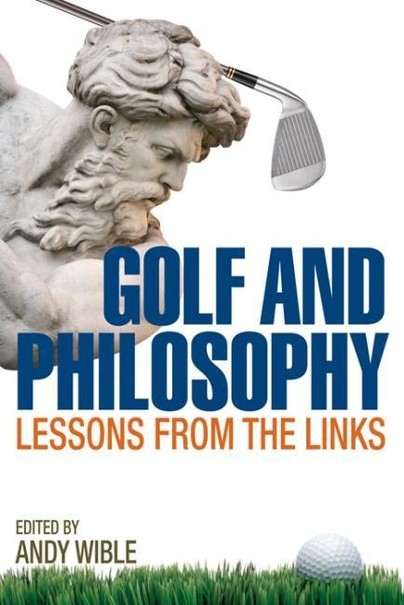
Format: Hardback
Pages: 264
ISBN: 9780813125947
Pub Date: 24 Sep 2010
Illustrations: none
Description:
In a game where players are expected to call their own penalties and scoring the least points leads to victory, decorum takes precedence over showmanship and philosophical questions become par for the course. Few other sports are as suited for ethical and metaphysical examination as golf. It is a game defined by dichotomies -- relaxing, yet frustrating, social, yet solitary -- and between these extremes there is room for much philosophical inquiry.
In Golf and Philosophy: Lessons from the Links, a clubhouse full of skilled contributors tee off on a range of philosophical topics within the framework of the fairway. The book's chapters are arranged in the style of an eighteen-hole golf course, with the front nine exploring ethical matters of rationality and social civility in a world of moral hazards and roughs. The back nine pries even deeper, slicing into matters of the metaphysical, including chapters on mysticism, idealism, identity, and meaning.Taken together, the collection examines the intellectual nature of this beloved pastime, considering the many nuances of a sport that requires high levels of concentration, patience, and consistency, as well as upstanding moral character. Golf and Philosophy celebrates the joys and complexities of the game, demonstrating that golf has much to teach both its spectators and participants about modern life.
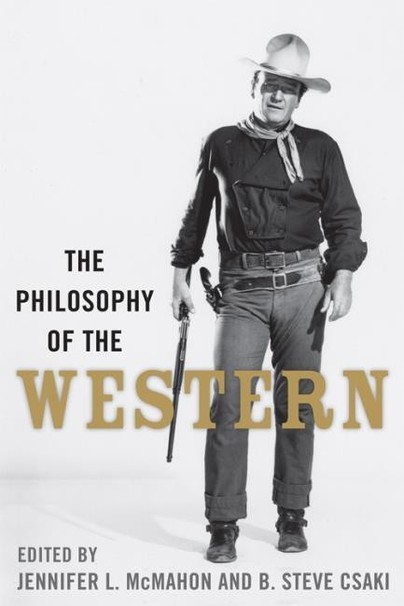
Format: Hardback
Pages: 352
ISBN: 9780813125916
Pub Date: 02 Jul 2010
Description:
The western is arguably the most iconic and influential genre in American cinema. The solitude of the lone rider, the loyalty of his horse, and the unspoken code of the West render the genre popular yet lead it to offer a view of America's history that is sometimes inaccurate. For many, the western embodies America and its values.
In recent years, scholars had declared the western genre dead, but a steady resurgence of western themes in literature, film, and television has reestablished the genre as one of the most important.In The Philosophy of the Western, editors Jennifer L. McMahon and B. Steve Csaki examine philosophical themes in the western genre. Investigating subjects of nature, ethics, identity, gender, environmentalism, and animal rights, the essays draw from a wide range of westerns including the recent popular and critical successes Unforgiven (1992), All the Pretty Horses (2000), 3:10 to Yuma (2007), and No Country for Old Men (2007), as well as literature and television serials such as Deadwood. The Philosophy of the Western reveals the influence of the western on the American psyche, filling a void in the current scholarship of the genre.
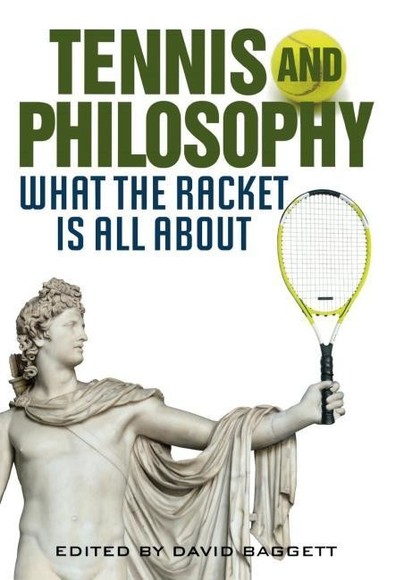
Format: Hardback
Pages: 294
ISBN: 9780813125749
Pub Date: 04 Jun 2010
Illustrations: 0 b&w photo
Description:
Tennis smashed onto the worldwide athletic scene soon after its modern rules and equipment were introduced in nineteenth-century England. Exciting, competitive, and uniquely accessible to people of all ages and talent levels, tennis continues to enjoy popularity, both as a recreational activity and a spectator sport.Life imitates sport in Tennis and Philosophy.
Editor David Baggett approaches tennis not only as a game but also as a surprisingly rich resource for philosophical analysis. He assembles a team of champion scholars, including David Foster Wallace, Robert R. Clewis, David Detmer, Mark Huston, Tommy Valentini, Neil Delaney, and Kevin Kinghorn, to consider numerous philosophical issues within the sport. Profiles of tennis greats such as John McEnroe, Roger Federer, the Williams sisters, and Arthur Ashe are paired with pertinent topics, from the ethics of rage to the role of rivalry. Whether entertaining metaphysical arguments or examining the nature of beauty, these essays promise insightful discussion of one of the world's most popular sports.
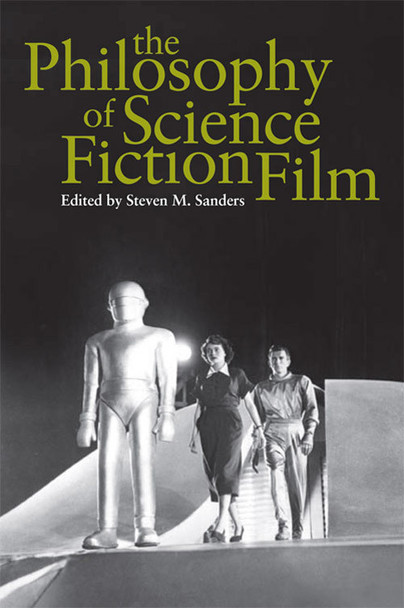
Format: Paperback
Pages: 240
ISBN: 9780813192604
Pub Date: 05 Feb 2010
Illustrations: none
Description:
The science fiction genre maintains a remarkable hold on the imagination and enthusiasm of the filmgoing public, captivating large audiences worldwide and garnering ever-larger profits. The Philosophy of Science Fiction Film explores the storylines, conflicts, and themes of fifteen science fiction film classics, from Metropolis to The Matrix. Editor Steven M.
Sanders and a group of outstanding scholars in philosophy, film studies, and other fields raise science fiction film criticism to a new level by penetrating the surface of the films to expose the underlying philosophical arguments, ethical perspectives, and metaphysical views.
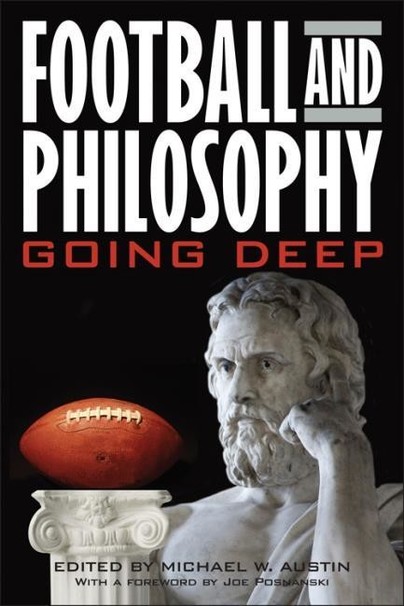
Format: Paperback
Pages: 240
ISBN: 9780813192192
Pub Date: 31 Jul 2009
Illustrations: 0
Description:
Football and Philosophy: Going Deep investigates many of the issues surrounding the nation's biggest sport. From a review of the flaws of the Bowl Championship Series, to a study of the violence inherent in the game, to an examination of Vince Lombardi's views on winning, the essays in this collection tackle the moral and philosophical principles behind gridiron competition. The result is an insightful, humorous, and original book that will engage all fans of the game.
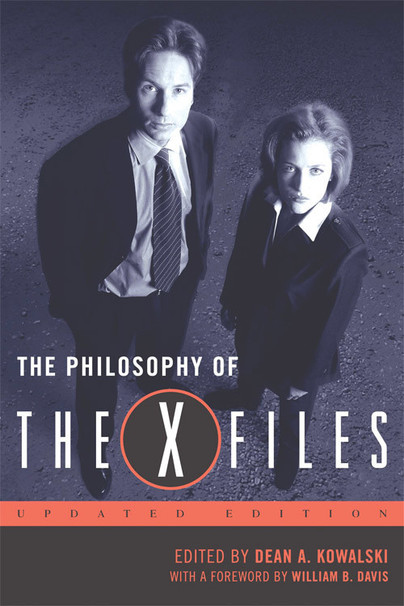
Format: Paperback
Pages: 314
ISBN: 9780813192277
Pub Date: 27 Mar 2009
Illustrations: 0
Description:
In The Philosophy of The X-Files, Dean A. Kowalski has gathered a remarkable cast of contributors to shed light on the philosophical mysteries of the television show The X-Files. With sections devoted to the show's credos, such as "The Truth Is Out There," individual characters, and specific episodes, The Philosophy of The X-Files illuminates the philosophical assumptions and presuppositions of the show as well as presents discussions through the show to help the reader better understand philosophy and philosophical inquiry.
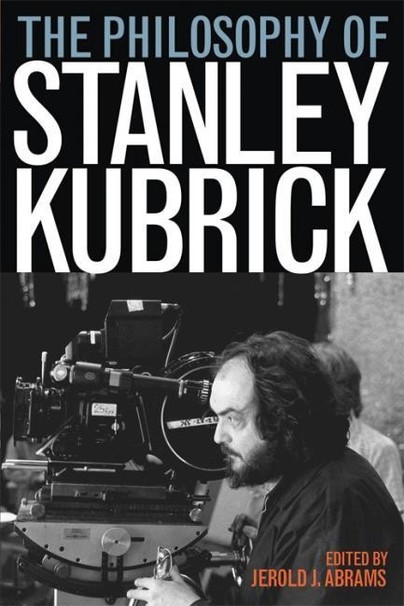
Format: Paperback
Pages: 288
ISBN: 9780813192208
Pub Date: 13 Feb 2009
Description:
In The Philosophy of Stanley Kubrick, some of our most respected philosophers investigate Kubrick's art to illuminate his view of reality. In films like 2001: A Space Odyssey, Eyes Wide Shut, and Dr. Strangelove, Kubrick explores the world honestly, mirroring the vast complexity of the world of philosophy.
Dividing the book into sections on war, love, history, and other rich topics, the contributors find ample proof of the philosophical genius of Stanley Kubrick.
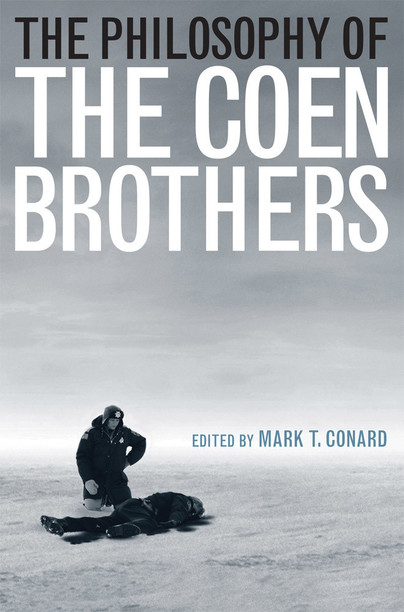
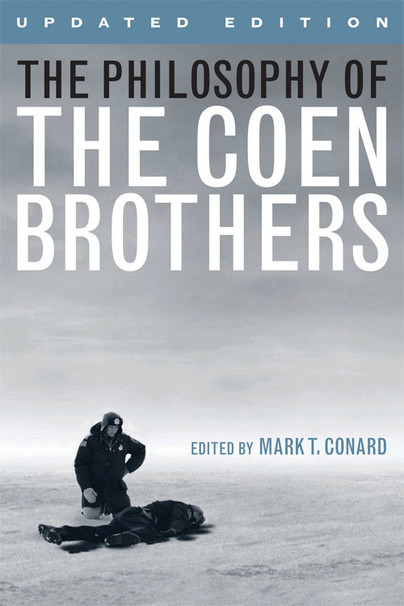
Pages: 304
ISBN: 9780813125268
Pub Date: 12 Dec 2008
Illustrations: 0
Pages: 332
ISBN: 9780813134451
Pub Date: 30 Mar 2012
Description:
Many critics agree that Joel and Ethan Coen are one of the most visionary and idiosyncratic filmmaking teams of the last three decades. Combining thoughtful eccentricity, wry humor, irony, and often brutal violence, the Coen brothers have crafted a style of filmmaking that pays tribute to classic American movie genres yet maintains a distinctly postmodern feel. Since arriving on the film scene, the Coens have amassed an impressive body of work that has garnered them critical acclaim and a devoted cult following.
From Raising Arizona and Fargo to O Brother, Where Art Thou? and No Country for Old Men, the Coens have left an unmistakable imprint on Hollywood. The Philosophy of the Coen Brothers investigates philosophical themes in the works of these master filmmakers and also uses their movies as vehicles to explore fundamental concepts of philosophy. The contributing authors discuss concepts such as justice, the problem of interpretation, existential role-playing, the philosophy of comedy, the uncertainty principle, and the coldness of modernity. The Philosophy of the Coen Brothers is not just for die-hard Lebowski Fest attendees, but for anyone who enjoys big ideas on the big screen.
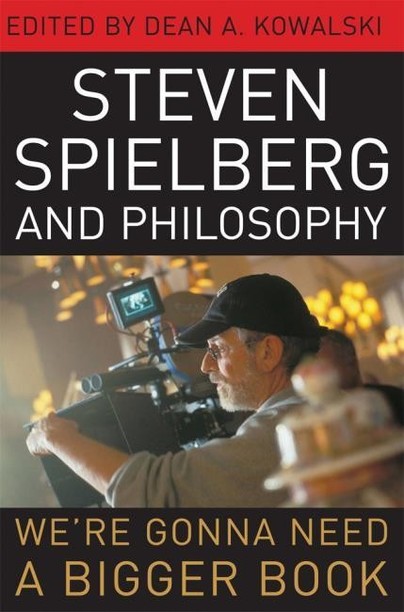
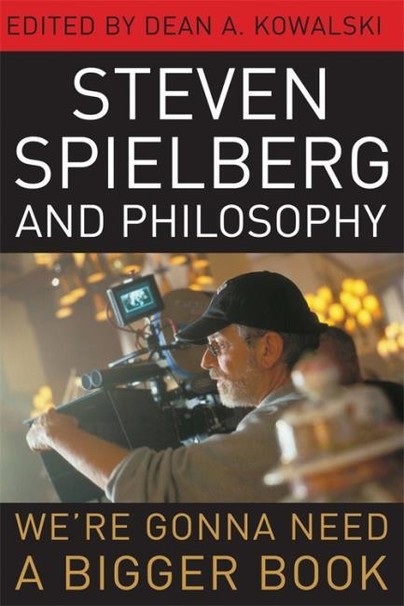
Pages: 288
ISBN: 9780813125275
Pub Date: 21 Nov 2008
Illustrations: 17
Pages: 288
ISBN: 9780813133898
Pub Date: 04 Feb 2011
Illustrations: 17
Description:
Without question, few directors have had such a powerful influence on the film industry and the moviegoing public as Steven Spielberg. Often referred to as the most successful American filmmaker of all time, Spielberg has been nominated for the Academy Award for Best Director six times, winning twice -- for Schindler's List in 1994 and Saving Private Ryan in 1999. Seven of his films have received the Best Picture Oscar nomination.
He has brought to life some of the most popular heroes of all time, such as Indiana Jones, as well as some of the most despised villains, including Amon Goeth from Schindler's List and the killer shark from Jaws. Whatever the subject -- dinosaurs, war, extra-terrestrials, slavery, the Holocaust, or terrorism -- one clear and consistent touchstone is present in all of Spielberg's films: an interest in the human condition. In Steven Spielberg and Philosophy, Dean A. Kowalski and some of the nation's most respected philosophers investigate Spielberg's art to illuminate the nature of humanity. The book explores rich themes such as cinematic realism, fictional belief, terrorism, family ethics, consciousness, virtue and moral character, human rights, and religion in Spielberg's work. Avid moviegoers and deep thinkers will discover plenty of common ground in this collection.
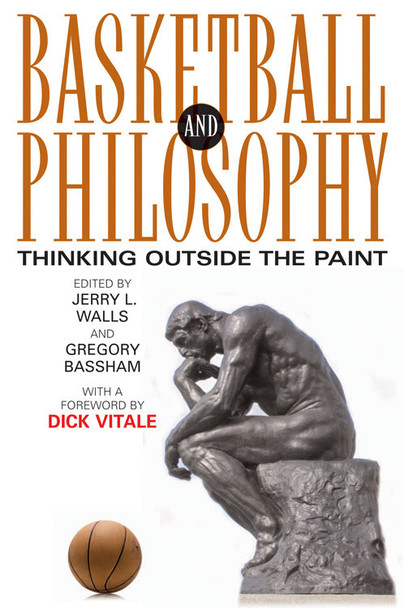
Format: Paperback
Pages: 304
ISBN: 9780813191867
Pub Date: 15 Feb 2008
Description:
With a Foreword by Dick Vitale What can the film Hoosiers teach us about the meaning of life? How can ancient Eastern wisdom traditions, such as Taoism and Zen Buddhism, improve our jump-shots? What can the "Zen Master" (Phil Jackson) and the "Big Aristotle" (Shaquille O'Neal) teach us about sustained excellence and success?
Is women's basketball "better" basketball? How, ethically, should one deal with a strategic cheater in pickup basketball? With NBA and NCAA team rosters constantly changing, what does it mean to play for the "same team"? What can coaching legends Dean Smith, Rick Pitino, Pat Summitt, and Mike Krzyzewski teach us about character, achievement, and competition? What makes basketball such a beautiful game to watch and play? In Basketball and Philosophy, a Dream Team of twenty-six academics trained in philosophy -- also diehard hoops fans -- proves that basketball is the thinking fan's sport. Whether you play basketball, coach it, or just love to watch it, this book will forever enrich your understanding and appreciation of the game.
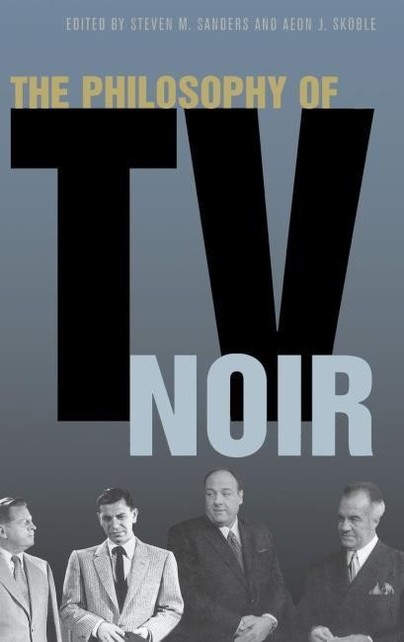
Format: Hardback
Pages: 288
ISBN: 9780813124490
Pub Date: 04 Jan 2008
Description:
The influence of classic film noir on the style and substance of television in the 1950s and 1960s has persisted to the present day. Its pervasiveness suggests the vitality of the noir depiction of human experience and the importance of TV for transmitting the legacy of film noir and producing new forms of noir. Noir television is also noteworthy for its capacity to raise philosophical questions about the nature of the human condition.
Drawing from the fields of philosophy, media studies, and literature, the contributors to The Philosophy of TV Noir illuminate the best of noir television, including such shows as Dragnet, The Fugitive, Miami Vice, The X-Files, CSI, and 24.

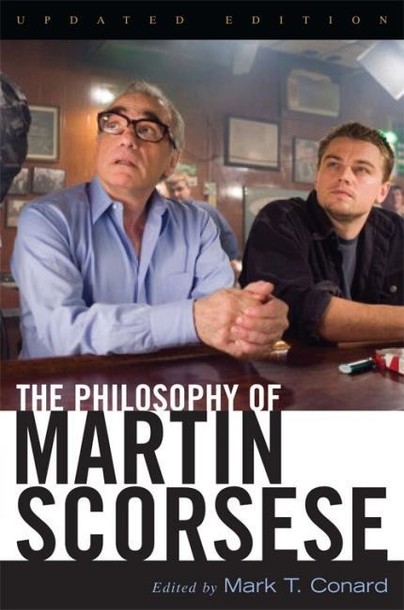
Pages: 280
ISBN: 9780813124445
Pub Date: 31 May 2007
Pages: 280
ISBN: 9780813192185
Pub Date: 17 Jul 2009
Description:
In The Philosophy of Martin Scorsese, an impressive cast of contributors explores the complex themes and philosophical underpinnings of Martin Scorsese's films. One of the most significant filmmakers in the history of American cinema, Scorsese is the creative force behind films such as GoodFellas, Taxi Driver, The Last Temptation of Christ, The Aviator, and The Age of Innocence. The contributing authors use Scorsese's films as vehicles for exploration of philosophical concepts such as friendship and egoism, vigilantism, libertarianism, Buddhist ethics, desire and self-restraint, madness, the criminal mind, beatitude and unhappiness, and the absurd.
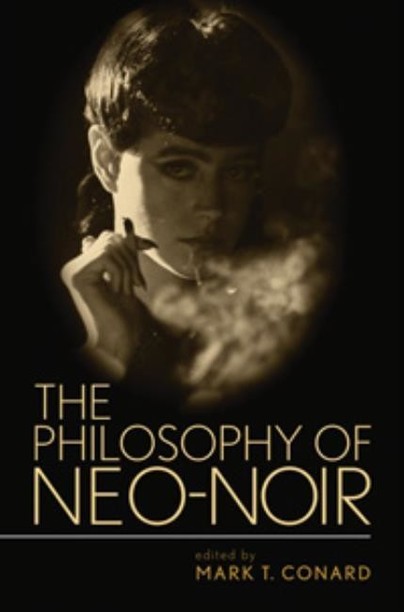
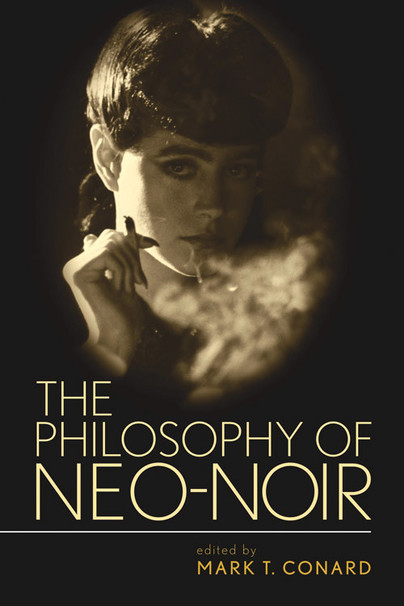
Pages: 222
ISBN: 9780813124223
Pub Date: 05 Jan 2007
Illustrations: photos
Pages: 222
ISBN: 9780813192178
Pub Date: 20 Feb 2009
Illustrations: photos
Description:
Film noir--a cycle of American films from the 1940s and '50s--is characterized not only by a constant opposition of light and shadow and a disruptive compositional balance of frames and scenes, but also by dark, foreboding characters and plots and an overriding sense of alienation and moral ambiguity. Noir films reflect the sense of loss, fragmentation, and nihilism at the heart of the human condition in the twentieth century. Although the classic film noir period ended in the late 1950s, its impact on more films has been profound.
While typically not black and white, these new films incorporate the noir sensibility of alienation, pessimism, moral ambivalence, and disorientation. This sensibility is obvious in films such as Blade Runner, Reservoir Dogs, Chinatown, and Memento. Until now, little scholarly attention has been paid to the unique philosophical conventions of the widely popular neo-noir genre. In The Philosophy of Neo-Noir, editor Mark T. Conard and other contributors explore the philosophical foundations of neo-noir, using the films to discuss and explain traditional philosophical ideas as well. The themes and topics covered include justice and moral corruption; problems of memory and identity; human nature, space, time, and subjectivity; crime and punishment; pain and redemption; and spiritual transcendence. Conard argues that neo-noir films have benefited as censorship has relaxed, giving current filmmakers a rich noir tradition from which to draw.
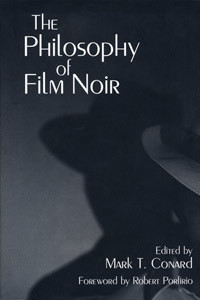
Format: Paperback
Pages: 264
ISBN: 9780813191812
Pub Date: 27 Jan 2005
Description:
From The Maltese Falcon (1941) to Touch of Evil (1958), the classic film noir is easily recognizable for its unusual lighting, sinister plots, and feeling of paranoia. For critics and fans alike, these films defined an era. The Philosophy of Film Noir explores philosophical themes and ideas inherent in classic noir and neo-noir films, establishing connections to diverse thinkers ranging from Camus to the Frankfurt School.
The authors, each focusing on a different aspect of the genre, explore the philosophical underpinnings of classic films such as The Big Sleep (1946), Out of the Past (1947), and Pulp Fiction (1994). They show how existentialism and nihilism dominate the genre as they explore profound themes in a vital area of popular culture.



















